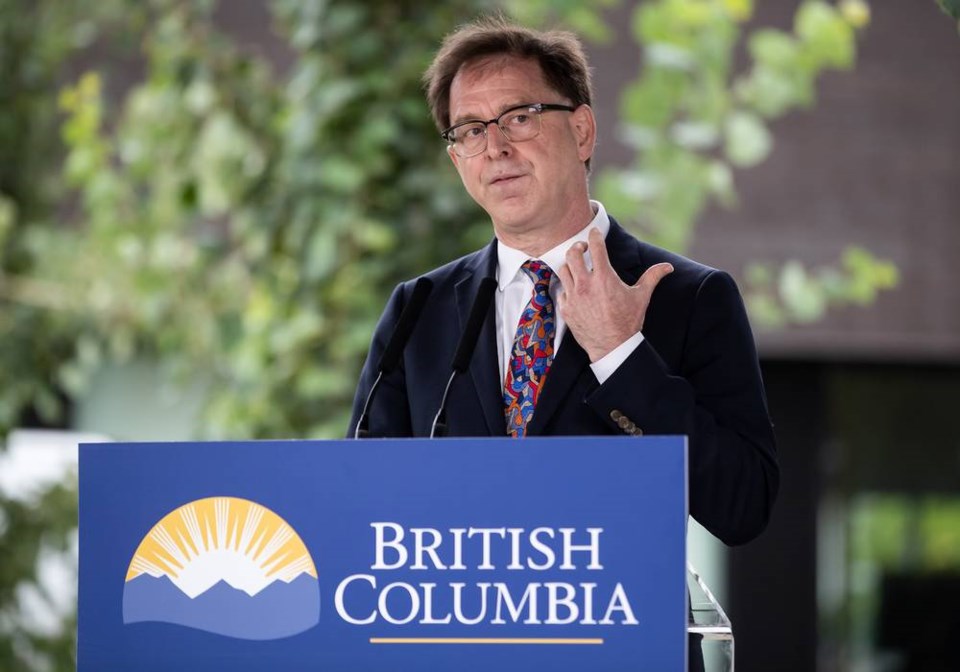There were mixed signals this week about whether the tougher COVID-19 restrictions over the past six weeks will be relaxed in 10 days time.
The measures to short-circuit the pandemic’s third wave were announced March 29. Some have already been extended once and others were imposed later. They expire on May 25, but could easily be extended again.
Officials are unhappy with the current case count, but encouraged by the growing vaccination rate, which now tops 50 per cent of those eligible.
The overall pandemic profile since the restrictions were imposed has changed significantly in B.C. The number of new cases has declined.
Health Minister Adrian Dix said Thursday it’s moving in the right direction, but “let’s face it, 500 to 600 cases a day is still way too high.”
It dipped below 500 on Friday.
There were 387 people hospitalized with COVID-19 as of Friday, down about 100 from the early-April peak, but Dix said that, too, is “still way too high.”
It’s still about 100 patients higher than when the tougher measures were imposed on March 29. ICU counts are also higher.
The hospital numbers were a key factor in the decision to tighten restrictions, as concerns arose that they couldn’t handle what was called at the time an “exponential growth” in the number of cases.
Even with the case rate dropping, Dix said more than 1,000 surgeries in Metro Vancouver have been cancelled recently to preserve beds for potential COVID-19 patients. There are still vacant beds ready, but in the Fraser and Vancouver Coast health authorities, surge beds are now in use, meaning the base capacity there is full.
On the plus side, another 1.5 million people have been vaccinated since the end of March. The vaccination rate was 14 per cent when the short circuit effort was announced. It’s now 51.5 per cent and tens of thousands are getting shots each day.
But figures released this week show the various vaccines are not magic bullets. Provincial health officer Dr. Bonnie Henry said B.C. has recorded 1,340 cases of COVID-19 in people who were vaccinated, 30 of whom died.
The figures confirm the vaccines vastly reduce the risk. But they don’t eliminate it.
The storyline has taken some turns. The negative indicators all continued climbing for two weeks after the measures were announced.
The first measures included the shutdown of Whistler, a renewed ban on indoor restaurant dining imposed with only a half-day notice, and restricted indoor religious services and some gym activities.
As the cases grew, recommendations against non-essential travel were converted to formal orders. The indoor restaurant shutdown was originally to last for three weeks, but was later extended to May 25. An expensive relief package was announced to help the hospitality industry.
Even with the short-circuit measures, about 37,000 new cases have developed in the six weeks since they were first announced, and there have been 176 more deaths.
The peak of the third wave of the pandemic was reached on April 14, when the rolling seven-day average number of cases topped 1,100 a day.
It has since subsided to under 600.
The third wave more or less derailed a “restart” effort that got underway last spring and summer, when cases ebbed. Officials announced they were stepping back from it in November, after sustained growth in the case rate.
On Thursday, Henry referred to “restart 2.0,” saying work is underway on what it might look like.
“Expect to start seeing that after the May long weekend in more detail. I’m working with my colleagues across the country to make sure we are all aligned in some of the messaging we’re giving.”
That signal suggests the restrictions will start lifting in some fashion, even with the unease about the continued high case count.
Henry also told people to stay tuned for information on celebrating graduation ceremonies safely this spring.
The orders could simply expire or be amended. The bans on indoor restaurant dining and non-essential travel between regions are among the highest-profile restrictions.
They could also be adjusted on a regional basis. Henry issued social-gathering orders specific to Vancouver Coastal and Fraser health authorities in November and shut down Whistler this spring.
It’s encouraging to hear the word “restart” again, but its extent will depend on next week’s numbers.
